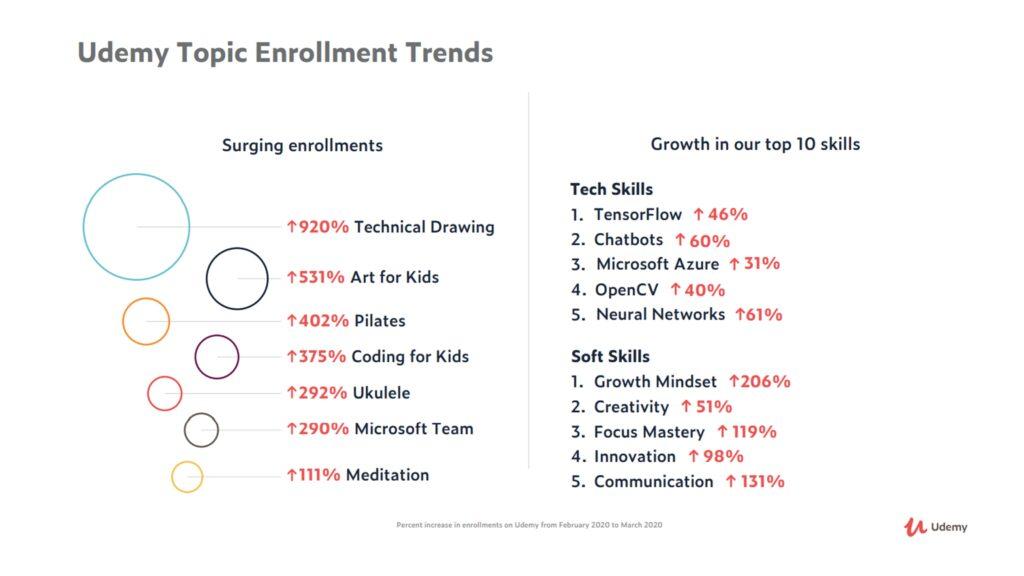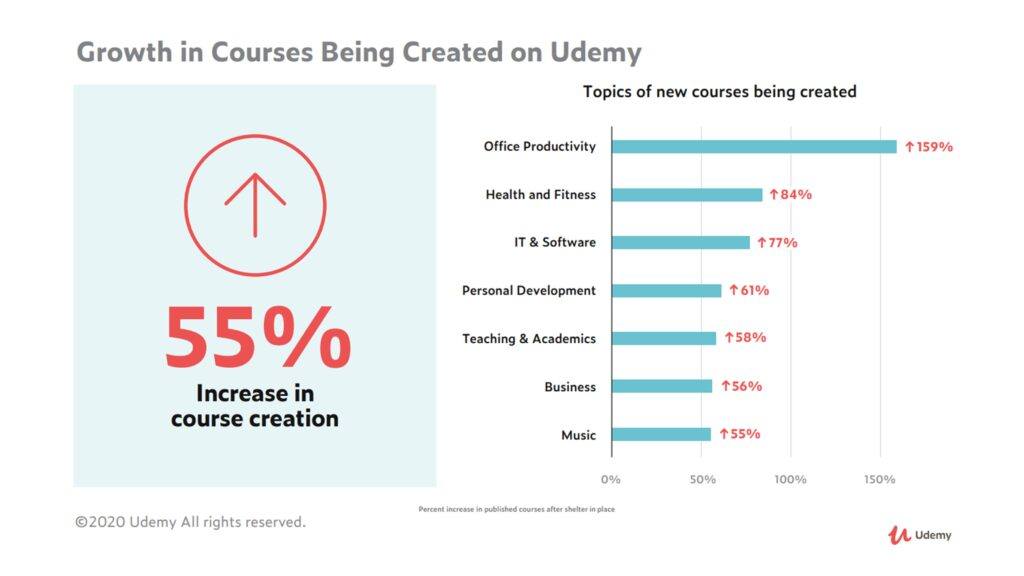Udemy: Heading Towards the Perfect Storm

With COVID-19 pandemic looming ahead, Udemy, the world's largest online learning platform, may have found itself heading towards “the perfect storm”.
Emerged over a decade ago, online learning platforms have made high quality video lectures from the world’s best professors and experts more accessible than ever. Since then, online learning platforms were the subject of plenty of hype. New York Times even predicted that 2012 would be “the year of massive open online course”. Today, we all know that online learning did not live up to that expectation and several online learning platforms have slowly fizzled and died. However, COVID-19 pandemic is giving online learning platforms another fighting chance to emerge as “winners” of the COVID-19 pandemic. Leading the pack is the world’s largest online learning platform, Udemy.
Udemy was founded in 2010 with the goal of making quality education more accessible and improve lives through learning. Over the years, it has attracted over $170M in funding and over 57,000 expert instructors teaching over 150,000 online courses. Despite its tremendous growth, Udemy remains unprofitable in late 2019. It was clear that Udemy was facing several barriers including low course completion rate and growth in the number of rivals. However, with COVID-19 pandemic looming ahead, Udemy may have found itself heading towards “the perfect storm”.
As millions of people are turning to online learning to pick up new skills as they look for ways to be productive while sheltering in place, Udemy is poised to capitalize on this opportunity. Udemy has set itself up for success through 3 main ways: (1) Course variety (2) Course creation through everyday experts (3) Global network
Course variety: Compared to its rivals, Udemy course catalog contains both technical and non-technical courses. The majority of online learning platforms in the market focuses only on offering technical courses such as web development, data science, and financial analysis. On the contrary, Udemy also provide non-technical courses centered on lifestyle and health support. During the COVID-19 pandemic, these lifestyle courses became more important than ever as people are trying to maintain their physical and mental wellbeing. As a result, Udemy has seen tremendous growth in these courses with enrollment in Pilates increased by 402% and Meditation increased by 111%. In addition, Udemy also offers hundreds of courses directly related to COVID-19 that surely captured the attention of anxious customers at the pandemic’s outset.
Course creation through everyday experts: Unlike other major online learning platforms, the majority of courses at Udemy are not created by professional instructors but are created by everyday experts. With additional free time during shelter in place, these everyday experts are working to supplement or replace their lost income. As a result, Udemy has seen a 55% growth in the number of courses created. Categories with the highest surge in new courses include Office Productivity (159% increase), Health and Fitness (84%), IT & Software (77%), and Personal Development (61%).
Global network: Over the years, Udemy has expanded internationally to over 190 countries with courses available in more than 50 languages. Outside of the U.S., the company has also set up offices in Denver, Brazil, India, Ireland, and Turkey. Through this global network, Udemy is then best positioned to capture the various trends across the globe. During the COVID-19 pandemic, Udemy has seen an increased enrollment across geographies with 130% growth in the U.S., 200% in India, 320% in Italy, and 280% in Spain. It is also important to note that people from different countries are also gravitating toward different courses. For example, Americans are gravitating toward creative skills like Adobe Illustrator (326% increase) while Indians are learning Communication Skills (606%) and Spanish are taking Piano (466%).
As a result, Udemy soared during the COVID-19 pandemic where the number of enrollments grew by 425% or 25 million new enrollments in Q3 of 2020.
The COVID-19 pandemic marks a pivotal moment for online learning. With it comes a lasting change in the ways we learn. With greater numbers of people being exposed to online learning for the first time, the possibility is now limitless. It is therefore without a doubt that Udemy will continue to grow beyond the pandemic as it capitalize on the explosion of online learning around the world.
End notes:
“How COVID-19 saved online learning platforms like Udemy and Udacity,” BusinessInsider, August 13, 2020
“Online Education Steps Up: What the World is Learning (from Home),” UdermyResearch, 2020
New Udemy Report Shows Surge in Global Online Education in Response to COVID-19, Business Wire, April 30, 2020
Online educators Udemy and Coursera are red-hot right now. But that may not be the case all summer, TheBusinessofBusiness, June 9, 2020
“Udemy Thinks It’s Cracked the Future of Online Education,” Time, February 12, 2016



Great read! I do agree that Udemy and other online learning platforms are winners of the pandemic. I do think though that the problems that Udemy was facing prior to the pandemic will reemerge post-pandemic. People will be busy again with their regular lifestyles and might not engage with the platform anymore. Personally, I am a user of Udemy and have bought around 15 courses if not more on the platform (prior to the pandemic), I barely completed 5 of them. One of the issues that I have with the platform is that their marketing strategy relies on constant heavy discounts all the time. I cannot remember one time where I went into the platform without a 90% discount on all courses or so. I believe customers eventually pick up on that and start viewing the company as non-professional where the courses are not worth their original price. This leads people not to buy any courses until there are discounts thus hurting their revenues. Additionally, a lot of the courses do look like they were recorded by non-professionals which also hurts the perception in customers’ minds about the quality of the education, even though the content might still be extremely helpful. I think if Udemy wants to continue on its success, they need to start providing discounts on specific occasions only and not constantly, and they need to improve the quality assurance on the production side. I still like the platform and I personally am an engaged user and will always find new things to learn about on Udemy. I still do not view it as a place where I would seek professional skill development, rather only for hobbies and personal curiosity.
Great post! You touch upon this, but Udemy operates in an extremely competitive space. Not only are there several MOOCs, but also an increasing abundance of high-quality, free content (think YouTube, Kahn Academy, Harvard University giving out free content at the start of the pandemic). My outlook is fairly bleak here, as this free content is rising, while content production costs can’t improve (i.e., you will always have to update / reproduce content for the latest coding languages, techniques, etc.).
From my understanding, Udemy is more geared towards adult learners. I wonder how this platform could be adopted for K-12 learning which I think is where the real crisis is during COVID. Parents are struggling to manage jobs while also having to oversee remote learning that for many children requires almost 1:1 supervision (or risk kids falling behind in school). Do you think there is a future there?
Hey Max, thanks for writing this article. I enjoyed this read. I wanted to build on Karl’s point on how many of their packages are discounted and how only a fraction of students actually complete their courses online. I think solo learning does have its drawbacks, but I do think this can combatted by charging more. I think if students had to pay more, they are more likely to complete the course because of a much higher opportunity cost. Just like Jibran, I’m not particularly optimistic about online learning’s outlook, they were after all struggling to make a profit pre-covid, pointing to a flawed business model. I wonder if COVID has given them a false sense of confidence due to the shift in user behavior. I also unsure this behavior will be permanent going forward.